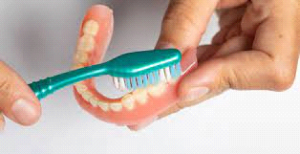What are Dentures?

Dentures are removable appliances for the replacement of missing teeth and surrounding tissue. They are made of either plastic or porcelain and resemble the natural teeth of a person to give an aesthetically pleasing look. If you have some missing teeth or don’t have teeth at all, you may want to get dentures. Dentures not only help you get a better look and a proper face structure, but it also lets you chew food properly. The convenient part about dentures is that they are removable by the one wearing them, so you don’t have to visit the dentist every time you want to remove them for cleaning.
What are the types of dentures?
There are mainly two types of dentures — complete dentures and partial dentures.
1. Complete dentures:
When a person has no teeth at all, complete dentures are required. They can also be required in a situation where the person does have some teeth left but want them removed and replaced. Complete dentures are of 2 types: “conventional” and “immediate”.
- Conventional dentures: Conventional dentures are usually made after all the teeth have been removed and the gum tissue has completely healed. This is because it needs to be an exact fit. However, it does take at least 4 to 6 weeks for the gum tissue to heal, and in the time being, you may have to stay without any teeth.
- Immediate dentures: Immediate dentures are made in advance and can be placed as soon as the teeth are removed, even when the gum tissue hasn’t healed. Due to this, you may have to get adjustments done to your dentures after your gum tissue has healed as the gums do tend to shrink after healing.
Immediate dentures can also be used as a temporary solution to wear at the time when your gum tissues are healing. As soon as they heal, you can get properly measured for conventional dentures and wear the proper fit. This way, you don’t have to stay without teeth for those 4 to 6 weeks.
2. Partial dentures:
When a person has some natural teeth but others are missing, partial dentures are required. They are made to look like the surrounding teeth and align the frame very naturally. Partial denture consists of replacement teeth attached to plastic base that resembles the gum. This base is connected by a metal framework that holds the denture in place in the person’s mouth. There are different kinds of partial dentures but the main difference between them is the material used to create them. They can be made of acrylic, metal, porcelain, etc.
What is the process of getting dentures?
The process of getting dentures is very simple but may require several appointments and visits to the dentist. This is because dentures require several adjustments until it is a really natural and comfortable fit for your mouth.
The first step in the process of getting dentures is to establish what kind of dentures will be suitable for your condition. As discussed above, people with no teeth will need complete dentures, and people with a few teeth missing will need partial dentures. You will discuss the possible options with your dentist and come to the ideal solution.
The second step is to remove teeth, if any, for complete dentures. If not, we move on to the next step, that is, to take highly accurate impressions and measurements of your mouth. These impressions are then used to create your custom denture.
Once the denture is made, you may be asked to wear them to see the proper fit, and to check other things like color, feel, shape etc. If they are not entirely comfortable, more adjustments will be made to the denture until it is a natural fit for you.
What are the problems of wearing a denture?
In the beginning, you may feel a bit of soreness from wearing the denture. You may also observe increased mouth salivation, discomfort in chewing, and possible speech problems. These complications are normal and only temporary. In a few weeks, you will get comfortable with the denture and won’t even feel the difference sometimes. However. if these problems you observed continue on even after a few months of getting the denture, you should contact your dentist.
Due to more muscle movement in the jaw bone, the lower denture may feel a bit more uncomfortable to you. That too is entirely natural. As getting dentures is a complicated process, getting used to them also takes time.

One of the most important things to remember about getting dentures is that you need to keep them clean. Just as natural teeth require care, dentures do too. Usually after eating, you should remove your dentures and gently clean them with a soft toothbrush. Make sure no food is stuck in them. At the same time, don’t forget to rinse your mouth.
Always remember to handle your dentures gently. Rough use can break them early or cause other problems. If you need more instructions on how to take proper care of your dentures, have a conversation about it with your dentist.
Our experts are Dental RI are here to help you with multiple visits to ensure a comfortable and satisfactory experience with your dentures. If you think you need dentures, contact us right away. In your appointment, you can discuss your needs with a dentist and continue with the treatment you feel most confident about.
